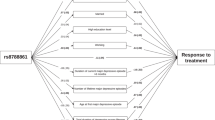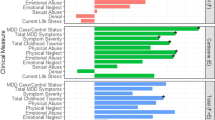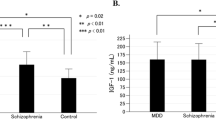Abstract
Genetic variation underlying hypothalamic pituitary adrenal (HPA) axis overactivity in healthy controls (HCs) and patients with severe forms of major depression has not been well explored, but could explain risk for cortisol dysregulation. In total, 95 participants were studied: 40 patients with psychotic major depression (PMD); 26 patients with non-psychotic major depression (NPMD); and 29 HCs. Collection of genetic material was added one third of the way into a larger study on cortisol, cognition and psychosis in major depression. Subjects were assessed using the Brief Psychiatric Rating Scale, the Hamilton Depression Rating Scale and the Structured Clinical Interview for Diagnostic and Statistical Manual of Mental Disorders. Blood was collected hourly for determination of cortisol from 1800 to 0900 h and for the assessment of alleles for six genes involved in HPA axis regulation. Two of the six genes contributed significantly to cortisol levels, psychosis measures or depression severity. After accounting for age, depression and psychosis, and medication status, only allelic variation for the glucocorticoid receptor (GR) gene accounted for a significant variance for mean cortisol levels from 1800 to 0100 h (r2=0.288) and from 0100 to 0900 h (r2=0.171). In addition, GR and corticotropin-releasing hormone receptor 1 (CRHR1) genotypes contributed significantly to psychosis measures and CRHR1 contributed significantly to depression severity rating.
This is a preview of subscription content, access via your institution
Access options
Subscribe to this journal
Receive 12 print issues and online access
$259.00 per year
only $21.58 per issue
Buy this article
- Purchase on Springer Link
- Instant access to full article PDF
Prices may be subject to local taxes which are calculated during checkout


Similar content being viewed by others
References
Anton RF . Urinary free cortisol in psychotic depression. Biol Psychiatry 1987; 22: 24–34.
Posener JA, DeBattista C, Williams GH, Kraemer HC, Kalehzan BM, Schatzberg AF . 24-Hour monitoring of cortisol and corticotropin secretion in psychotic and nonpsychotic major depression. Arch Gen Psychiatry 2000; 57: 755–760.
Belanoff JK, Kalehzan M, Sund B, Fleming Ficek SK, Schatzberg AF . Cortisol activity and cognitive changes in psychotic major depression. Am J Psychiatry 2001; 158: 1612–1616.
Keller J, Flores B, Gomez RG, Solvason HB, Kenna H, Williams GH et al. Cortisol circadian rhythm alterations in psychotic major depression. Biol Psychiatry 2006; 60: 275–281.
Lembke A, Gomez R, Tenakoon L, Keller J, Cohen G, Williams GH et al. The mineralocorticoid receptor agonist, fludrocortisone, differentially inhibits pituitary-adrenal activity in humans with psychotic major depression. Psychoneuroendocrinology 2012; 38: 115–121.
Evans DL, Burnett GB, Nemeroff CB . The dexamethasone suppression test in the clinical setting. Am J Psychiatry 1983; 140: 586–589.
Nelson JC, Davis JM . DST studies in psychotic depression: a meta-analysis. Am J Psychiatry 1997; 154: 1497–1503.
Schatzberg AF, Rothschild AJ, Stahl JB, Bond TC, Rosenbaum AH, Lofgren SB et al. The dexamethasone suppression test: identification of subtypes of depression. Am J Psychiatry 1983; 140: 88–91.
Rothschild AJ, Schatzberg AF, Rosenbaum AH, Stahl JB, Cole JO . The dexamethasone suppression test as a discriminator among subtypes of psychotic patients. Br J Psychiatry 1982; 141: 471–474.
Arana GW, Baldessarini RJ, Ornsteen M . The dexamethasone suppression test for diagnosis and prognosis in psychiatry. Commentary and review. Arch Gen Psychiatry 1985; 42: 1193–1204.
Lupien SJ, Gillin CJ, Hauger RL . Working memory is more sensitive than declarative memory to the acute effects of corticosteroids: a dose-response study in humans. Behav Neurosci 1999; 113: 420–430.
Gomez RG, Fleming SH, Keller J, Flores B, Kenna H, DeBattista C et al. The neuropsychological profile of psychotic major depression and its relation to cortisol. Biol Psychiatry 2006; 60: 472–478.
Leonard BE, Myint A . The psychoneuroimmunology of depression. Hum Psychopharmacol 2009; 24: 165–175.
Hsu SY, Hsueh AJ . Human stresscopin and stresscopin-related peptide are selective ligands for the type 2 corticotropin-releasing hormone receptor. Nat Med 2001; 7: 605–611.
De Kloet ER . Hormones and the stressed brain. Ann NY Acad Sci 2004; 1018: 1–15.
Turner JD, Alt SR, Cao L, Vernocchi S, Trifonova S, Battello N et al. Transcriptional control of the glucocorticoid receptor: CpG islands, epigenetics and more. Biochem Pharmacol Ann NY Acad Sci 2010; 80: 1860–1868.
Sanchez MM, Young LJ, Plotsky PM, Insel TR . Autoradiographic and in situ hybridization localization of corticotropin-releasing factor 1 and 2 receptors in nonhuman primate brain. J Comp Neurol 1999; 408: 365–377.
Keck ME, Kern N, Erhardt A, Unschuld PG, Ising M, Salyakina D et al. Combined effects of exonic polymorphisms in CRHR1 and AVPR1B genes in a case/control study for panic disorder. Am J Med Genet B Neuropsychiatr Genet 2008; 147B: 1196–1204.
Liu Z, Zhu F, Wang G, Xiao Z, Wang H, Tang J et al. Association of corticotropin-releasing hormone receptor1 gene SNP and haplotype with major depression. Neurosci Lett 2006; 404: 358–362.
Bradley RG, Binder EB, Epstein MP, Tang Y, Nair HP, Liu W et al. Influence of child abuse on adult depression: moderation by the corticotropin-releasing hormone receptor gene. Arch Gen Psychiatry 2008; 65: 190–200.
Ressler KJ, Bradley B, Mercer KB, Deveau TC, Smith AK, Gillespie CF et al. Polymorphisms in CRHR1 and the serotonin transporter loci: gene x gene x environment interactions on depressive symptoms. Am J Med Genet B Neuropsychiatr Genet 2010; 153B: 812–824.
Binder EB, Owens MJ, Liu W, Deveau TC, Rush AJ, Trivedi MH et al. Association of polymorphisms in genes regulating the corticotropin-releasing factor system with antidepressant treatment response. Arch Gen Psychiatry 2010; 67: 369–379.
van Winsen LM, Manenschijn L, van Rossum EF, Crusius JB, Koper JW, Polman CH et al. A glucocorticoid receptor gene haplotype (TthIII1/ER22/23EK/9beta) is associated with a more aggressive disease course in multiple sclerosis. J Clin Endocrinol Metab 2009; 94: 2110–2114.
Koper JW, Stolk RP, de Lange P, Huizenga NA, Molijn GJ, Pols HA et al. Lack of association between five polymorphisms in the human glucocorticoid receptor gene and glucocorticoid resistance. Hum Genet 1997; 99: 663–668.
van Rossum EF, van den Akker EL . Glucocorticoid resistance. Endocr Dev 2011; 20: 127–136.
El-Hage W, Phillips ML, Radua J, Gohier B, Zelaya FO, Collier DA et al. Genetic modulation of neural response during working memory in healthy individuals: interaction of glucocorticoid receptor and dopaminergic genes. Mol Psychiatry 2011; 18: 174–182.
Fortier ME, Sengupta SM, Grizenko N, Choudhry Z, Thakur G, Joober R . Genetic evidence for the association of the hypothalamic-pituitary-adrenal (HPA) axis with ADHD and methylphenidate treatment response. Neuromolecular Med 2013; 15: 122–132.
Krishnamurthy P, Romagni P, Torvik S, Gold PW, Charney DS, Detera-Wadleigh S et al. Glucocorticoid receptor gene polymorphisms in premenopausal women with major depression. Horm Metab Res 2008; 40: 194–198.
van Rossum EF, Binder EB, Majer M, Koper JW, Ising M, Modell S et al. Polymorphisms of the glucocorticoid receptor gene and major depression. Biol Psychiatry 2006; 59: 681–688.
Binder EB, Salyakina D, Lichtner P, Wochnik GM, Ising M, Putz B et al. Polymorphisms in FKBP5 are associated with increased recurrence of depressive episodes and rapid response to antidepressant treatment. Nat Genet 2004; 36: 1319–1325.
Mehta D, Gonik M, Klengel T, Rex-Haffner M, Menke A, Rubel J et al. Using polymorphisms in FKBP5 to define biologically distinct subtypes of posttraumatic stress disorder: evidence from endocrine and gene expression studies. Arch Gen Psychiatry 2011; 68: 901–910.
Zimmermann P, Bruckl T, Nocon A, Pfister H, Binder EB, Uhr M et al. Interaction of FKBP5 gene variants and adverse life events in predicting depression onset: results from a 10-year prospective community study. Am J Psychiatry 2011; 168: 1107–1116.
Binder EB, Bradley RG, Liu W, Epstein MP, Deveau TC, Mercer KB et al. Association of FKBP5 polymorphisms and childhood abuse with risk of posttraumatic stress disorder symptoms in adults. JAMA 2008; 299: 1291–1305.
Hamilton M . A rating scale for depression. J Neurol Neurosurg Psychiatry 1980; 23: 49–65.
Thase ME, Hersen M, Bellack AS, Himmelhoch JM, Kupfer DJ . Validation of a Hamilton subscale for endogenomorphic depression. J Affect Disord 1983; 5: 267–278.
Overall JE, Gorham DE . The brief psychiatric rating scale. Psychol Rep 1961; 10: 799–812.
First MB, Spitzer RL, Gibbon M, Williams JBW . Structured Clinical Interview for DSM-IV-TR Axis I Disorders-Patient Edition. SCID-I/P, 1/2007 revision.
Pettersson FH, Anderson CA, Clarke GM, Barrett JC, Cardon LR, Morris AP et al. Marker selection for genetic case-control association studies. Nat Protoc 2009; 4: 743–752.
Lomelin D, Jorgenson E, Risch N . Human genetic variation recognizes functional elements in noncoding sequence. Genome Res 2010; 20: 311–319.
Frazer KA, Ballinger DG, Cox DR, Hinds DA, Stuve LL, Gibbs RA et al. A second generation human haplotype map of over 3.1 million SNPs. Nature 2007; 449: 851–861.
De Bakker PI, Graham RR, Altshuler D, Henderson BE, Haiman CA . Transferability of tag SNPs to capture common genetic variation in DNA repair genes across multiple populations. Pac Symp Biocomput 2006; 478–486.
Ballard DH, Cho J, Zhao H . Comparisons of multi-marker association methods to detect association between a candidate region and disease. Genet Epidemiol 2010; 34: 201–212.
Greenwood TA, Lazzeroni LC, Murray SS, Cadenhead KS, Calkins ME, Dobie DJ et al. Analysis of 94 candidate genes and 12 endophenotypes for schizophrenia from the Consortium on the Genetics of Schizophrenia. Am J Psychiatry 2011; 168: 930–946.
Gauderman WJ, Murcray C, Gilliland F, Conti DV . Testing association between disease and multiple SNPs in a candidate gene. Genet Epidemiol 2007; 31: 383–395.
Kwee LC, Liu D, Lin X, Ghosh D, Epstein MP . A powerful and flexible multilocus association test for quantitative traits. Am J Hum Genet 2008; 82: 386–397.
Claes S . Glucocorticoid receptor polymorphisms in major depression. Ann NY Acad Sci 2009; 1179: 216–228.
Kumsta R, Entringer S, Koper JW, van Rossum EF, Hellhammer DH, Wust S . Sex specific associations between common glucocorticoid receptor gene variants and hypothalamus-pituitary-adrenal axis responses to psychosocial stress. Biol Psychiatry 2007; 62: 863–869.
Sinclair D, Fullerton JM, Webster MJ, Shannon Weickert C . Glucocorticoid receptor 1B and 1C mRNA transcript alterations in schizophrenia and bipolar disorder, and their possible regulation by GR gene variants. PLoS ONE 2012; 7: e31720.
Schatzberg AF, Posener JA, DeBattista C, Kalehzan BM, Rothschild AJ, Shear PK . Neuropsychological deficits in psychotic versus nonpsychotic major depression and no mental illness. Am J Psychiatry 2000; 157: 1095–1100.
Garrett A, Kelly R, Gomez R, Keller J, Schatzberg AF, Reiss AL . Aberrant brain activation during a working memory task in psychotic major depression. Am J Psychiatry 2011; 168: 173–182.
Kelly R, Garrett A, Cohen J, Gomez RG, Lembke A, Keller J et al. Altered brain function underlying verbal memory encoding and retrieval in psychotic major depression. Psychiatry Res Neuroimaging 2012; 211: 119–126.
Szczepankiewicz A, Rybakowski JK, Suwalska A, Hauser J . Glucocorticoid receptor polymorphism is associated with lithium response in bipolar patients. Neuro Endocrinol Lett 2011; 32: 545–551.
Syed AA, Halpin CG, Irving JA, Unwin NC, White M, Bhopal RS et al. A common intron 2 polymorphism of the glucocorticoid receptor gene is associated with insulin resistance in men. Clin Endocrinol (Oxf) 2008; 68: 879–884.
Kumsta R, Moser D, Streit F, Koper JW, Meyer J, Wust S . Characterization of a glucocorticoid receptor gene (GR, NR3C1) promoter polymorphism reveals functionality and extends a haplotype with putative clinical relevance. Am J Med Genet B Neuropsychiatr Genet 2009; 150B: 476–482.
Rovaris DL, Mota NR, de Azeredo LA, Cupertino RB, Bertuzzi GP, Polina ER et al. MR and GR functional SNPs may modulate tobacco smoking susceptibility. J Neural Transm 2013.
Funk CK, O'Dell LE, Crawford EF, Koob GF . Corticotropin-releasing factor within the central nucleus of the amygdala mediates enhanced ethanol self-administration in withdrawn, ethanol-dependent rats. J Neurosci 2006; 26: 11324–11332.
Keller J, Shen L, Gomez RG, Garrett A, Solvason HB, Reiss A et al. Hippocampal and amygdalar volumes in psychotic and nonpsychotic unipolar depression. Am J Psychiatry 2008; 165: 872–880.
Ishitobi Y, Nakayama S, Yamaguchi K, Kanehisa M, Higuma H, Maruyama Y et al. Association of CRHR1 and CRHR2 with major depressive disorder and panic disorder in a Japanese population. Am J Med Genet B Neuropsychiatr Genet 2012; 159B: 429–436.
Ray LA, Sehl M, Bujarski S, Hutchison K, Blaine S, Enoch MA . The CRHR1 gene, trauma exposure, and alcoholism risk: a test of G x E effects. Genes Brain Behav 2013; 12: 361–369.
Ribbe K, Ackermann V, Schwitulla J, Begemann M, Papiol S, Grube S et al. Prediction of the risk of comorbid alcoholism in schizophrenia by interaction of common genetic variants in the corticotropin-releasing factor system. Arch Gen Psychiatry 2011; 68: 1247–1256.
Hsu DT, Mickey BJ, Langenecker SA, Heitzeg MM, Love TM, Wang H et al. Variation in the corticotropin-releasing hormone receptor 1 (CRHR1) gene influences fMRI signal responses during emotional stimulus processing. J Neurosci 2012; 32: 3253–3260.
Mahon PB, Zandi PP, Potash JB, Nestadt G, Wand GS . Genetic association of FKBP5 and CRHR1 with cortisol response to acute psychosocial stress in healthy adults. Psychopharmacology (Berl) 2013; 227: 231–241.
Wasserman D, Sokolowski M, Rozanov V, Wasserman J . The CRHR1 gene: a marker for suicidality in depressed males exposed to low stress. Genes Brain Behav 2008; 7: 14–19.
Acknowledgements
Aspects of this study were supported by grants from the Pritzker Foundation, NIH MH50604 to Alan Schatzberg, NIH MH19938 to Alan Schatzberg, and NIH/NCRR CTSA award number UL1 RR025744.
Author information
Authors and Affiliations
Corresponding author
Ethics declarations
Competing interests
In the last 3 years, Dr Alan Schatzberg has served as a consultant for the following companies: BrainCells, CeNeRx, Cervel, Eli Lilly, Forest Labs, GSK, Jazz, Lundbeck, Merck, Neuronetics, Novadel, Novartis, Pfizer, PharmaNeuroBoost, Sanofi-Aventis, Sunovion, Synosia, Takeda, Xhale, Xytis and Wyeth. He has held equity in the following companies: Amnestix, BrainCells, CeNeRx, Cervel, Corcept (co-founder), Delpor, Forest Labs, Merck, Neurocrine, Novadel, Pfizer, PharmaNeuroBoost, Somaxon, Synosia and Xhale. Dr Schatzberg is a named inventor on pharmacogenetic use patents on prediction of antidepressant response and glucocorticoid antagonists in psychiatry. Dr Greer Murphy has served as a consultant for Brain Resource, Ltd. Fredric B Kraemer has served as a consultant for BASF. Several authors have been named on a provisional use patent related to the findings in this manuscript, including Alan Schatzberg, Laura Lazzeroni, Greer Murphy and Jennifer Keller.
Additional information
Supplementary Information accompanies the paper on the Molecular Psychiatry website
Supplementary information
PowerPoint slides
Rights and permissions
About this article
Cite this article
Schatzberg, A., Keller, J., Tennakoon, L. et al. HPA axis genetic variation, cortisol and psychosis in major depression. Mol Psychiatry 19, 220–227 (2014). https://doi.org/10.1038/mp.2013.129
Received:
Revised:
Accepted:
Published:
Issue Date:
DOI: https://doi.org/10.1038/mp.2013.129
Keywords
This article is cited by
-
Self-immolative nanocapsules precisely regulate depressive neuronal microenvironment for synergistic antidepression therapy
Journal of Nanobiotechnology (2023)
-
Corticotropin releasing hormone receptor CRHR1 gene is associated with tianeptine antidepressant response in a large sample of outpatients from real-life settings
Translational Psychiatry (2020)
-
DNA methylation of HPA-axis genes and the onset of major depressive disorder in adolescent girls: a prospective analysis
Translational Psychiatry (2019)
-
Corticotropin-releasing factor 1 receptor haplotype and cognitive features of major depression
Translational Psychiatry (2018)
-
Glucocorticoid receptor signaling in astrocytes is required for aversive memory formation
Translational Psychiatry (2018)



